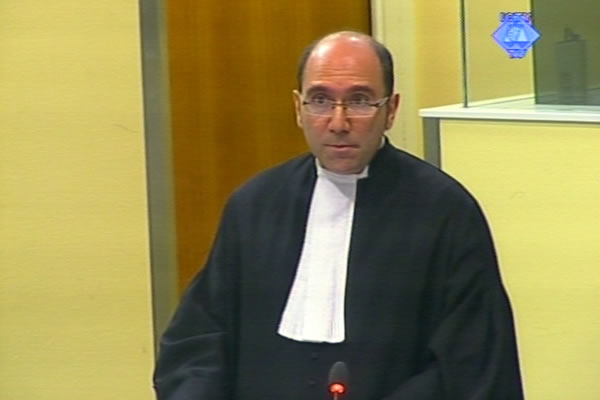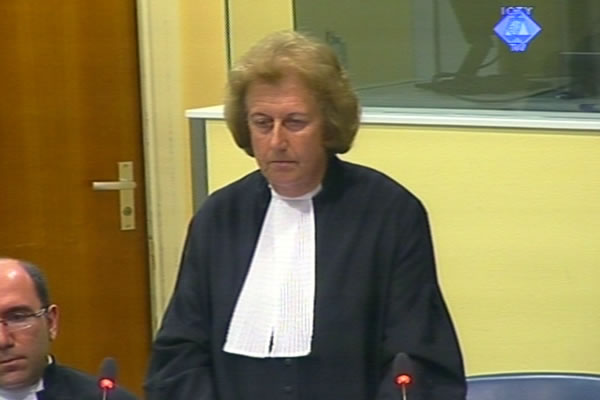Home
VIOLENT SOLUTIONS FOR LOST POLITICAL BATTLES
In the closing argument at the trial of Republika Srpska police officials Mico Stanisic and Stojan Zupljanin, the prosecution argued that the Bosnian Serbs had armed themselves to prevent Bosnia and Herzegovina’s independence by force, after they failed to do so by political means
 Alex Demirdjian, prosecutor at the Tribunal
Alex Demirdjian, prosecutor at the Tribunal On the first day of its closing argument at the trial of Mico Stanisic and Stojan Zupljanin, the prosecution focused on some of the crimes in BH municipalities listed in the indictment, on the relationship between the Bosnian Serb army and police and the responsibility of the accused Zupljanin. In 1992, Zupljanin was chief of the Security Services Center in Banja Luka. On the second day of its closing argument, the prosecution will address the role of Mico Stanisic, the first Bosnian Serb police minister. Stanisic and Zupljanin are charged with crimes against Croats and Muslims throughout BH in 1992.
The evidence showed that the crimes listed in the indictment didn’t happen randomly, the prosecution argued: they were committed systematically, according to a previously established plan. The prosecution didn’t deny that Muslims and Croats obtained arms, but insisted that Serbs weren’t preparing for the defense, but to ‘implement their goals by force after they had lost the political battle in preventing the recognition of BH as an independent state’.
The Serb police were secretly issued arms and were prepared to take over power in the municipalities Serbs had considered to be theirs. By late April 1992, Serbs seized power in 12 municipalities listed in the indictment, prosecutor Alex Demirdjian noted. The annual report of the Prijedor police stated that police officers were part of ‘an organized process of seizing power’. According to the pattern, the Serb police officers didn’t come to work in the night of the takeover. Masked armed men would then break into the police stations, beat up and arrest Croat and Muslims police officers who were on duty. The Serb officers returned to work the following day.
After the Serb takeover, Croats and Muslims were laid off and expelled. Their houses were burned down. Police arrested non-Serbs randomly and detained them in prison camps, police stations and other facilities. The conditions in detention facilities were inhuman and unhygienic. As the prosecution stated, 48 of the 52 detention facilities listed in the indictment were under the jurisdiction of the police. The prosecution also dismissed the defense’s suggestion that many of those centers were closed down after Zupljanin intervened at the RS MUP collegium meeting on 11 July 1992. In fact, the prison centers were closed down because of the revelations about their existence and the conditions therein broadcast by the Western media, the prosecution argued.
As prosecutor Joanna Korner argued, the defense didn’t deny the crimes. In many cases, the defense lawyers didn’t deny that the police had been involved in those crimes: they merely claimed that the accused didn’t know about the crimes. Zupljanin offered an alternative defense: even if he had known about the crimes, he did not have the authority to punish the perpetrators because the police were subordinated to the VRS, Korner said. The prosecution didn’t deny the fact that the police were placed under the army command in combat. However, the police were not under the army command at all times, but only when occasion warranted it.
Today the prosecution challenged three aspects of Zupljanin’s defensecase - that he was never a member of the SDS, that he didn’t attend the party meetings and that he was a member of the ARK Crisis Staff only briefly in May 1992. This would imply, the prosecution argued, that Zupljanin lived in a ‘glass castle’. On the contrary, the prosecution contends, Zupljanin was deeply involved and well-informed. Indeed, Zupljanin personally established the special police unit of the Banja Luka Security Services Center and kept it under his control; this unit committed several crimes. The defense ‘selectively quoted and interpreted evidence’ in a bid to contest the prosecution’s case about Zupljanin’s actual authority over the Banja Luka special unit. The prosecution ‘cannot fathom’ how Zupljanin could claim this was a military unit which was not under his control, when he himself signed their identity cards. Zupljanin controlled the special police unit; it was in fact his personal contribution to the forces implementing the takeover of power, the prosecution concluded.
The prosecution will continue its closing argument on Wednesday.Photos
Linked Reports
- Case : Zupljanin i Stanisic - "Bosnia and Herzegovina"
- 2012-03-30 CLOSING ARGUMENTS AT STANISIC AND ZUPLJANIN TRIAL
- 2012-03-28 ZUPLJANIN SEEKS TO TENDER NEW EVIDENCE
- 2012-03-09 PARTIES RESTED THEIR CASES AT THE TRIAL OF RS POLICE OFFICIALS
- 2012-05-30 PROSECUTION WANTS LIFE SENTENCE FOR STANISIC AND ZUPLJANIN
- 2012-05-31 DEFENSE CALLS JUDGES TO ACQUIT STANISIC AND ZUPLJANIN
- 2012-06-01 DEFENSE CALLS FOR ACQUITTAL OR MINIMUM SENTENCE FOR ZUPLJANIN

